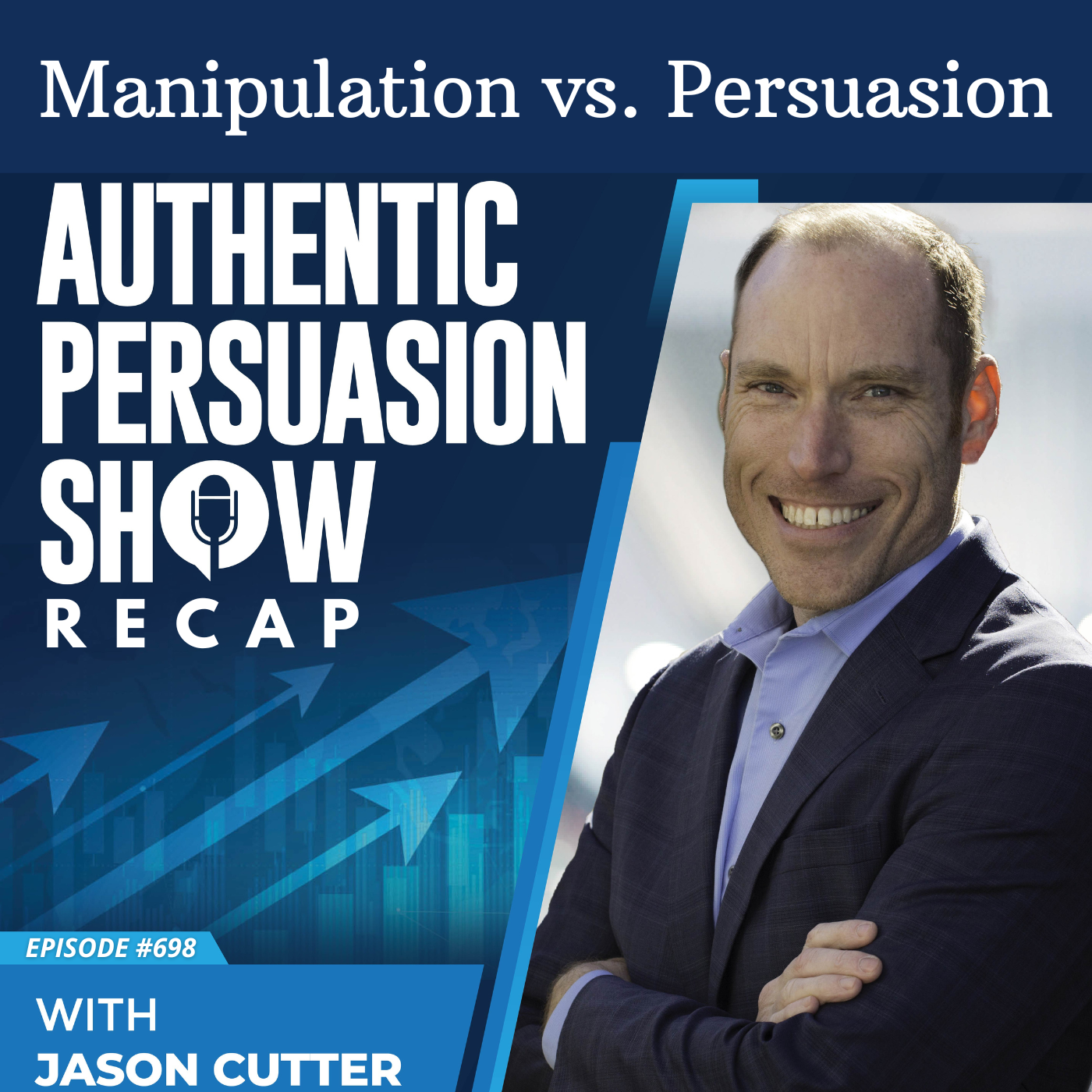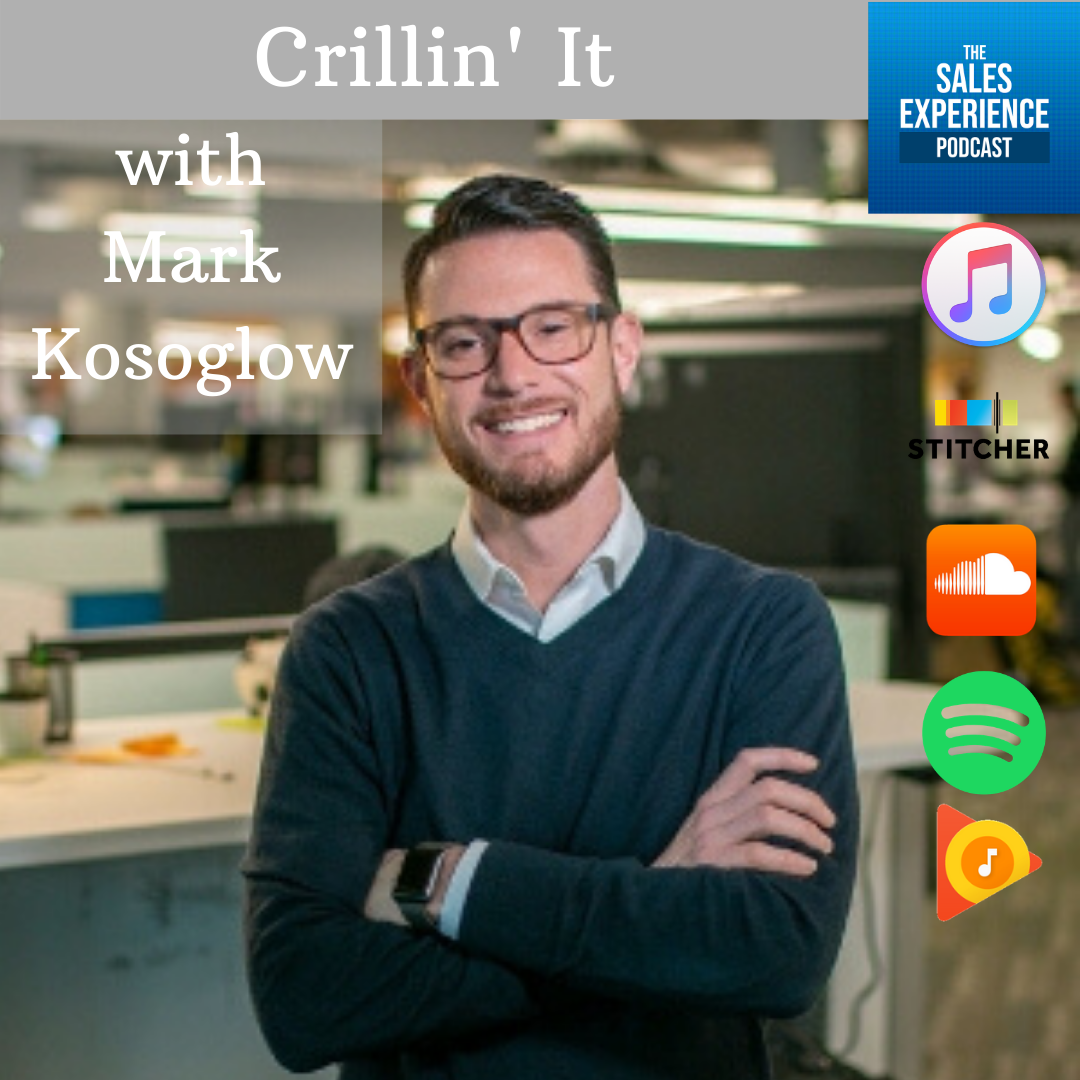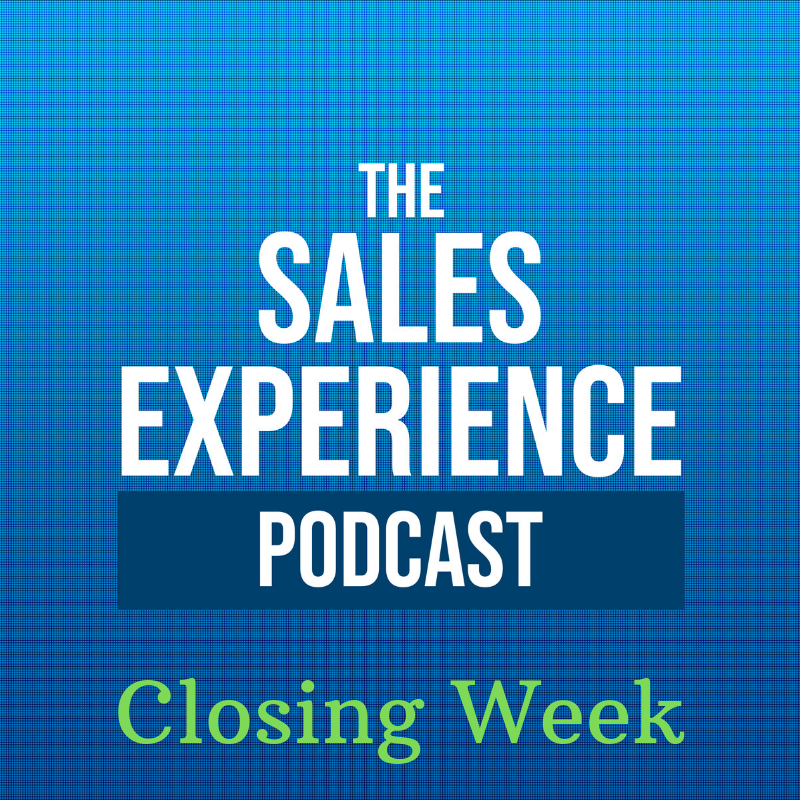Show Notes
This is part two of the conversation I had with Mary.
In Part 2, Mary and I talk about:
- The importance of mindset
- Consultative vs. Transaction sales
- Nature vs. Nurture of a sales professional
- How long you should make your reps sit through training
Download The Power of Authentic Persuasion ebook
Enroll in the Authentic Persuasion Online Course
Connect with Jason on LinkedIn
Connect with Mary on LinkedIn
Mary’s Info:
Mary Lombardo, Founder of Absolute Impact Corporation, a sales development firm that helps start-up and midsize companies increase profits through custom-designed sales solutions. Connect with her on LinkedIn and Twitter.
Mary has served in Executive Level Leadership and Management roles her entire career, generating revenues from $14 -$60 million dollars that led her to win the coveted title “Salesperson of the Year” both in 2008 and 2009 and joining the Million Dollar Club in 2007. Mary spearheaded and landed a colossal level win while in her role as the Senior Strategic Partnership Leader for Evans Newton, Inc. included a $5M sale for districtwide whole school reform programs that produced double-digit corporate profits.
Her clients have included:
• CEOs of F1000 companies
• CEOs of national education institution
• VPs of HR at national retail chain stores
• VPs of HR at national aerospace engineering company
• VPs of HR at a national real estate agency
• VP of HR at a national retirement facility
• Owners of Statewide Food Distribution companies
• District Superintendents nationwide
With 23 years of sales experience, Mary has a broad and deep scope of all aspects of the pipeline—from lead to close. She began her career as a field sales rep carrying a quota, climbed her way up the corporate ladder to VP of Sales for two f1000 companies. At the time Mary left the corporate world to launch Absolute Impact Corporation, she was managing nationwide sales teams, and sales Directors and still carried a quota!
In addition, Mary studied ballet for 10 years, is a wish granter for the Make-A-Wish Illinois Chapter, a volunteer at Lutheran General Hospital, a Court Appointed Special Advocate (CASA) working with the Cook County Juvenile Court, a lover of theater, and a proud mother of two children.
E123 – Transcript
Jason: Welcome back to the sales experience podcast. Today’s episode is a continuation of yesterday’s conversation with Mary Lombardo and I am picking up where we left off. Give you another bite-sized part of this mini-series. Please make sure to go to cutterconsultinggroup.com/podcast to find this episode on there to find all of Mary’s links and information on how to contact her. Now, she will cover this at the end of the final part of the mini-series, but if you can’t wait and you want to get ahold of her sooner, please go to cutterconsultinggroup.com/podcast find the episode transcript will be in there as well as all of her links now for the episode. Enjoy.
Mary: You know, that’s where attrition comes in because you know, if you’re not really working with your people and providing coaching and mentoring and you know, revisiting and debriefing on what went wrong and what went right and what could be done better the next time, you know, it can be demoralizing, especially for a brand new sales rep because sales is not for sissies. It’s a hard job. You know, it’s an inside job because at least in my experiences, I got a lot more nos than I ever did get a yes. But the yes is what made it all worthwhile.
Jason: Yeah. And that inside job, you know, I’m guessing you mean like a, a mental mindset, persistent thing, right? Where it’s what’s in your head. It’s the battle your facing where two people, two sales reps can sit next to each other or be working near each other and one can hear you know, eight nos and two yeses and be okay with it because they are, you know, long term. They’re looking at the long game and they don’t take it personal. And another rep can hear the eight no’s and hear two yeses and feel like they completely failed and they just can’t handle it and they just want to quit. And I think he said something interesting too a few minutes ago about like actually helping people and you know why you’re in it I think is a, is a very big one. And obviously you help companies with their hiring, with their training, with the coaching, with the management, the leadership, just everything sales related, you know, for bringing in people. And I think it’s so important for people, and I push this all the time for if you’re in sales to make sure you know why you’re in sales, why you’re doing it, what you want out of it. And then for trainers, for managers, for leaders, is to just make sure your people know why they’re there because that will help with that inside the mental game you’re talking about,
Mary: Yes. At least in the type of sales that I have done for 23 years. So for me, I’m talking about a consultative sale. So there are transactional sales and then there are consultative sales. And I’m very happy there are transactional sales because every time I want a new cell phone or a new computer, I go to the store. The nice salesperson sells me a new phone or a new computer, but I never see them again. And you know, it’s done transactional, I mean consultative sales. Really, about deep relationships, especially when you’re talking about long sales cycles that are multi-million dollars that are multi-year contracts that really significantly changed the financial trajectory of a company. You really have to come from a place of service, in my opinion. So you need to really be invested in the best interest of that prospect or customer because that’s going to get translated. It may not translate verbally, but it’s going to be translated in this kind of ethereal fashion of just knowing, you know, like I know when there’s something off about someone or that gut instinct of like, huh, I don’t know, there’s something fishy about that guy kind of thing. And it goes to the stereotype of, you know, the used car salesperson like, Oh yeah, anything just to sell you that car that’s not a consultative sale. Like you really have to be vested in the best interest of that customer and their goals.
Jason: Yeah. And so on the topic of training, right? So that’s where we’re kind of starting with. I know that’s always the challenge is how to train somebody to have that consultant. Do you think it’s possible to train somebody on that or do you think they have to come with that and then you teach them the product side?
Mary: Well I think it’s kind of, I mean essentially I think consultative sellers are born, that’s essentially it. You can teach skills but you can’t really teach people how to develop relationships that are sincere. So at least that’s my opinion. And I think that huge deals that are consultative selling that requires a lot of stakeholder involvement requires relationships that are based on trust and subject-matter expertise. And again, you know, sorry to beat a dead horse, but the interest of the client
Jason: for sure. And my only counter or thought about that as far as them being born is, I think it depends on what traits we’re talking about them being born with and or what they can learn. Because I think certain things like openness, willingness, curiosity, being able to ask questions, wanting to solve a problem, those are some basic traits that somebody has and they can develop them and enhance them in terms of using them for sales. Right? So like if you grew up and you like solving puzzles or problems or you know, taking things apart and putting them back together and see how things work, you know, if you have those skills you can take that as a strength and apply that to sales and then want to help others with their problems. And so I think it’s somewhere in that nature versus nurture what you’re born with. And then, you know, like for myself and my background, I don’t think I was born with sales skills. I wasn’t born in a sales family and there was some problem solving and some curiosity and some parts that I had. And then over time in a sales role, I leverage that and maximize that for the sake of helping other people.
Mary: I guess I would agree with that. Jason and I always get pushed back on that when I say that because you know, that’s just my opinion. But I get, and I do agree with the nature versus nurture. So for example, if, if you’re born and you have, you know, an innate musical talent and you’re, you live in a family where everybody’s a musician, you know, you might go into a music field, but yet you still have to practice your craft. And so I guess there could be the component of nature versus nurture.
Jason: Yeah. And I think it’s both sides, right? I think there’s some basic skills that people are born with and some level of, you know, also maturity and transformation where, you know, dealing with the NOs or dealing with somebody who’s putting up barriers when you’re in a sales process and that prospect is just throwing issue after issue or barrier or question and understanding where you want to get to and what you’re selling is important at some level, right? We’re not talking just purely things that are going to change someone’s life. But even like the giant enterprise stuff is believing what you’re selling and how it’s going to help and then you know, enhancing who you are and your strengths and leveraging those and also not worrying as much about your weaknesses, you know, if you can find success in those strengths that you have. So if we’re talking about training and the ongoing bit, what do you see? Like let’s just stay on the topic of like the big enterprise sales. So somebody listening to this as a sales rep or a manager or a leader and they’re selling large, you know, long sales cycle, enterprise-level, you know, type of packages, services, the products, what do you like and what do you promote as the regularity for the continuing education? There’s coaching on maybe their calls or their meetings and things like that, but then actual ongoing training skills, knowledge, you know, how often do you like to pepper that into a sales reps?
Mary: Yeah. So I think once a quarter is ideal and I think having a cohort of reps is also a really good idea because a bonding takes place with that cohort and they also become a support system for each other. So I think once a quarter is a good, a sufficient amount and then clearly the manager or the sales training company would have people that are out in the field with those reps in order to give them real-time feedback.
Jason: Yeah, just regularly. I think it’s also important for, like you said, the managers to be a part of that, to help either facilitating it if there is not a trainer, if there’s a trainer, obviously for the managers to be a part of it. And then also structuring it and knowing what kind of topics need to be covered. So in a management role or leadership role, just constantly looking at what it is that you know could be covered and how to layer that on. Because keeping in mind in the beginning it’s, you know, for any new person it’s drinking out of a fire hydrant. Literally, literally you just can’t handle it all. And you’ve got to do it. And then also reminders, like we were talking about where people, I know for myself and if you’re new in sales, you notice too, is where you don’t remember being taught this certain thing but you were and then you’ve forgotten it already. And so just constantly reminding. I know for me, I, when working with sales teams constantly think of something that I even forgot that I used to do years and years ago. So just constantly, constantly learning, constantly growing with some training in there. Now how do you like to do your training? How do you like to do like let’s say the initial new hire training?
Mary: Sure. So you know, the world has gone digital and everybody is short on time. So typically the companies that we work with want to know, can you, can we do this online? Can we do it without a trainer? Can I do, can we do a self-taught? Of course. And the answer is yes to all of those things. But I do not recommend that, especially for a brand new person or a new hire group. So if a large company has makes it a practice of hiring tend to 25 new salespeople twice a year. That needs to be an in person sales training needs to happen right after their onboarding. So, and typically that’s a week long process where they get onboarded with their HR staff and product information and then sales training would happen over a two day period. So it would be two half days.
Mary: And I get pushback on this to Jason because I have sat through sales training that works 10 hours long and they were a complete waste of time because, after a couple of hours my brain starts shutting down and I become that person that goes, we didn’t learn that. Yeah, it wasn’t taught, I just didn’t take it in. The first training would be over two days for four to five hours. It would cover topics that are pertinent to that business. So whether it’s an IT company, pharma company, an ad tech company, so whatever the CEO or whoever the stakeholders are want to make sure is covered that pertains to that business. Then information would be custom written into the curriculum. And that would talk about specifically their type of customer, their sales cycle, typical objections from that specific customer industry. And there would be general things like presentation skills, and storytelling skills, and overcoming objections. And then kind of, uh, actually we would first start out with like just a self-assessment to bring self awareness of what type of salesperson is there a different types of personas that are associated with each of us as salespeople. And that just kind of brings some self-awareness. So they would leave after two days with action items from the training homework that they would need to complete. And that would just start the course of this cohort. And we will continue on the process of, you know, a year-long sales training curriculum.
![[E123] Absolute Impact with Mary Lombardo – Part 2 of 4](https://episodes.castos.com/salesexperiencepodcast/images/Mary-Lombardo-Cover-Image.png)


